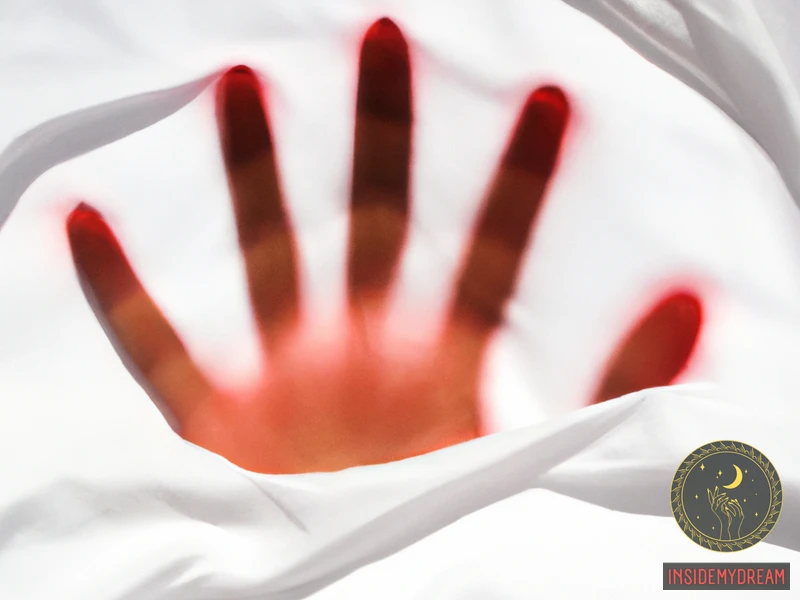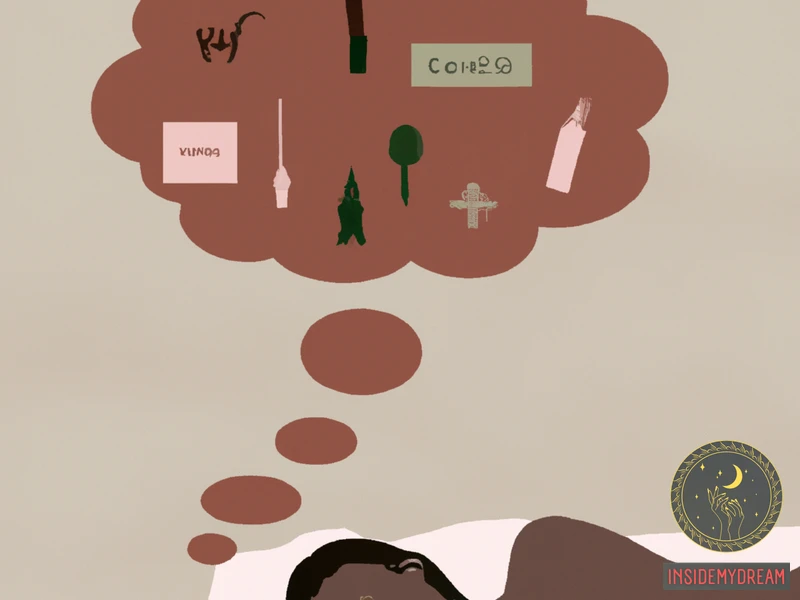Introduction

Dreams have been a mystery for centuries, and the human mind is still struggling to unravel their true meanings. While some dreams bring joy and peace, others can be quite the opposite, leaving us in a state of confusion, fear, and even horror. One such type of dream that falls into this category is violent and gory dreams. These dreams are often graphic and gruesome, filled with blood, gore, and even death. They can leave us feeling disturbed, anxious, and wondering what they could possibly mean. In this article, we will delve deep into the world of violent and gory dreams, exploring their different types, symbolism, and the dark side of our subconscious that triggers them. We’ll also discuss how to interpret these dreams and offer some tips on how to overcome the disturbance they can cause. So, let’s explore the mysteries of violent and gory dreams together.
What are Violent and Gory Dreams?
Violent and gory dreams are dreams that involve graphically violent scenes or situations, including bloodshed, death, or dismemberment. These types of dreams can be troubling, distressing and may cause fear even after waking up. More often than not, violent and gory dreams are associated with negative emotions such as confusion, fear, or anxiety.
It is natural to feel perplexed by such dreams or ask why they show up, causing concern and distress for many people. Psychologists believe that violent and gory dreams may be an attempt by our subconscious minds to process the emotions and experiences of our waking lives.
According to experts, these dreams can be interpretative and may hold important significance. Understanding the symbols and messages behind such dreams can provide valuable insights into your overall emotional and mental well-being.
To understand the meaning of dreams better, it is useful for readers to know the symbolism associated with other types of dreams. For example, the spiritual meaning of half-dressed dreams is commonly associated with anxiety and fear of exposure. The dream of working out, may signify mental and physical strength. The dream of dating can represent interpersonal relationships, while the dream of building often reflects a creative drive. The kiss on the forehead dream meaning is often connected with affection and closeness, and dreams about bed are linked to sleep and rest.
Below is a summary table that explains what violent and gory dreams are:
| Aspect | Description |
|---|---|
| Definition | Dreams which involve graphically violent scenes or situations, including bloodshed, death, or dismemberment |
| Associated Emotions | Confusion, fear, or anxiety |
| Interpretation | Attempt by the subconscious minds to process the emotions and experiences of our waking lives |
| Significance | May provide valuable insights into your overall emotional and mental well-being |
Why Do We Have Violent and Gory Dreams?
Violent and gory dreams are more common than many people realize. While they can be unsettling and even terrifying, it’s important to understand that these dreams are typically a manifestation of your subconscious thoughts and emotions rather than a reflection of your conscious desires or intentions.
There are several different theories about why we have violent and gory dreams, but most experts agree that they are often related to our internal fears, anxieties, and stressors. Some common reasons for violent and gory dreams include:
| 1. Trauma and PTSD | If you have experienced a traumatic event or have been diagnosed with post-traumatic stress disorder (PTSD), you may be more likely to have violent and gory dreams. This is because your subconscious is still processing the emotions and memories associated with the trauma. |
| 2. Repressed emotions and desires | Our subconscious minds are often better equipped to identify and process unconscious thoughts than our conscious minds. As a result, your dreams may be a way for your subconscious to work through unexpressed emotions or desires. For example, if you have repressed anger or aggression, you may have violent dreams as a way of processing and releasing those emotions. |
| 3. Anxiety and stress | Stress and anxiety are common triggers for violent and gory dreams. When you are feeling overwhelmed or anxious, your subconscious may be more likely to generate violent or frightening imagery as a way of processing those emotions. |
| 4. External stimuli | Sometimes, violent and gory dreams may be triggered by external stimuli such as movies, TV shows, or news stories that feature violence. Even listening to heavy metal or watching horror films before bed can increase the likelihood of having a disturbing dream. |
| 5. Unknown causes | Despite the many theories about why we have violent and gory dreams, sometimes there simply isn’t a clear cause. In these cases, it’s important to focus on the emotions and themes present in the dream rather than trying to determine a specific trigger. |
If you’re struggling to understand the meaning behind your violent or gory dreams, it may be helpful to speak with a therapist or dream analyst. They can help you parse out the underlying emotions and themes at play and provide guidance on how to move forward.
Anchor: tsunami dream meaning
The Different Types of Violent and Gory Dreams
As we explore the world of violent and gory dreams, it’s important to understand that not all of these dreams are the same. In fact, there are several different types of violent and gory dreams that one may experience. These dreams include nightmares, recurring dreams, and lucid dreams. Each type of dream presents a unique set of challenges and opportunities for interpretation. Understanding the different types of violent and gory dreams can help you better comprehend the messages your subconscious is trying to send. And who knows, maybe even offer you a clue about your past lives or some future events, such as Lion’s Gate 2024 or meeting members of The Beatles.
Nightmares
Nightmares are the most common type of violent and gory dreams. They are extremely vivid and often disturbing dreams that leave a person feeling frightened, anxious, or upset upon waking up. Nightmares typically occur during the REM stage of sleep, which means that they usually happen during the later part of the night.
During nightmares, individuals may see themselves being chased, attacked, or killed by someone or something. They may also witness horrific accidents or see their loved ones in danger. These types of dreams evoke intense emotions, which can lead to physical manifestations such as sweating, heart palpitations, and even nightmares.
The content of nightmares is often related to the stressful events that an individual has encountered throughout the day or week. They may also be a manifestation of unresolved conflicts or fears that are buried deep within the subconscious mind. Nightmares can also be a reflection of an individual’s mental health status or issues such as depression or anxiety.
It is important to note that not all bad dreams qualify as nightmares. They are more severe and can cause significant distress or impairment in daily functioning. When a person experiences recurring nightmares, it may be an indication that they are struggling to process and cope with their emotions and need to seek professional help.
Understanding the meaning behind nightmares can be beneficial in managing and coping with these distressing dreams. By examining the different symbols and imagery that appear in nightmares, individuals can begin to make connections between their dreams and their thoughts, feelings, and experiences in the waking world. However, interpreting dreams can be complex and challenging, and it is important to seek the guidance of a mental health professional to fully understand their meaning.
Anchors: Dream of pooping in your pants
Recurring Dreams
Recurring dreams are dreams that are experienced multiple times over a period of days, weeks, or even months. These dreams can be unsettling, as they often involve the same scenario, characters, or setting. Recurring dreams are an indication that there is something in the dreamer’s subconscious that needs to be addressed.
The following table illustrates some common themes in recurring violent and gory dreams:
| Dream Theme | Possible Interpretation |
|---|---|
| Being Chased | This dream may represent a feeling of being pursued or under pressure in waking life. It could also symbolize anxiety or fear. |
| Attack | This dream may represent unresolved anger or aggression towards someone or something. It could also indicate a feeling of vulnerability or a sense of being under attack in waking life. |
| Death | This dream may represent an ending or transition in waking life, such as a major change or the resolution of a problem. It could also indicate a fear of change or a fear of the unknown. |
| Teeth Falling Out | This dream may represent a loss of power or control in waking life, such as losing a job or a relationship. It could also symbolize a fear of aging or a fear of losing one’s attractiveness. |
| Crocodile | A crocodile in a dream may indicate hidden danger, deceit or treacherous situations. This may also be a sign for one to take action and overcome the obstacles or avoid risks. To know more about crocodile dreams meaning, click here. |
Recurring dreams can be a sign that the dreamer needs to address certain emotional issues or conflicts in their waking life. Working with a therapist or counselor can help the dreamer explore the deeper meanings of their recurring dreams and develop strategies for resolving any underlying issues.
Lucid Dreams
Lucid dreams are a unique type of dream where the dreamer is actively aware they are dreaming, and can often even control and manipulate the dream to some extent. These types of dreams can be both exciting and terrifying, depending on the content of the dream itself.
Characteristics of Lucid Dreams
Lucid dreams possess several distinctive characteristics that set them apart from other types of dreams. Here are some of the most common characteristics:
| Characteristics of Lucid Dreams | Description |
| Vividness and Clarity | The dreamer often experiences a higher level of clarity and detail in a lucid dream than in other types of dreams. |
| Self-Awareness | The dreamer becomes aware that they are dreaming, and sometimes even realizes they can control the dream. |
| Control and Manipulation | The dreamer can often manipulate and control some aspects of the dream, such as the environment, people, or events. |
| Emotional Intensity | Lucid dreams can evoke strong emotions, including fear, joy, and excitement. |
| Realistic Sensations | The dreamer may experience realistic sensations, such as touch, taste, and smell, which can add to the immersive nature of the dream. |
Why Do We Have Lucid Dreams?
The exact reasons why some people experience lucid dreams are still unknown, but research suggests that lucid dreaming may be connected to the brain’s ability to regulate the sleep-wake cycle. Some experts also believe that lucid dreaming may play a role in problem solving and creative thinking.
The Risks and Benefits of Lucid Dreams
While lucid dreams can be incredibly exciting and empowering, they can also have some drawbacks. For example, some people may find it difficult to distinguish between reality and dream states, leading to confusion and disorientation. Additionally, people with certain mental health conditions, such as anxiety or depression, may find that lucid dreaming exacerbates their symptoms.
Despite these potential risks, many people view lucid dreaming as a positive experience. Not only can it be fun and exciting, but it can also offer a unique opportunity for self-exploration and personal growth.
Symbolism in Violent and Gory Dreams

As we explore the world of violent and gory dreams, it’s essential to recognize the role that symbolism plays in these intense visual experiences. Our subconscious mind speaks to us through a symbolic language that can be difficult to decipher, but it can reveal deep truths about our emotions, fears, and desires. In this section, we will delve into the symbolism present in these dreams, including the common symbols that appear and the messages they may be trying to convey. Understanding the symbolic language of your dreams can be critical to unlocking their hidden meanings and gaining greater insight into your innermost thoughts and feelings.
Common Symbols in Violent Dreams
In violent dreams, there are certain symbols that are commonly seen and can help us understand the hidden message of our subconscious mind. Let’s take a look at some of these symbols and their possible interpretations.
| Symbol | Possible Interpretation |
|---|---|
| Blood | Represents life force, vitality, and energy. It can also symbolize violence, injury, or deep emotional wounds. |
| Death | Represents change, transformation, or the end of something. It can also represent fear, anxiety, or the unknown. |
| Attacker | Represents an external threat or an aspect of ourselves we are afraid of. It can also represent anger, aggression, or the need to defend ourselves. |
| Chase | Represents the feeling of being pursued or the desire to escape a situation. It can also represent inner conflict or the need to face our fears. |
| Fire | Represents destruction, purification, or transformation. It can also represent passion, anger, or intense emotion. |
It’s important to note that these symbols can have different meanings depending on the context of the dream and the individual’s personal experiences and associations. It’s also possible for a symbol to have both positive and negative interpretations.
Interpreting these symbols requires a deep understanding of one’s own psyche and experiences. Seeking the guidance of a therapist or dream interpreter can be helpful in deciphering the meaning of violent dream symbols.
Symbolism in Gory Dreams
Gory dreams can be disturbing and unsettling, but they can also hold valuable insights into our subconscious minds. The blood, gore, and violence in these dreams can have symbolic meanings that can help us better understand our innermost thoughts and feelings. Here are some possible symbolic meanings behind gory dreams:
- Death: Gory dreams that involve death can symbolize transformation, change, and rebirth. Alternatively, they can represent our fear of mortality and the impermanence of life.
- Violence: Dreams that involve acts of violence can be a sign of repressed anger or aggression. They can also represent our fear of being victimized or our desire for power and control.
- Blood: Dreams about blood can represent intense emotions, passion, or vitality. Alternatively, they can signify feelings of guilt, shame, or regret.
- Guts: Gory dreams that involve guts or internal organs can symbolize our innermost desires or fears. They can also represent the need to confront our deepest emotions or face our inner demons.
- Wounds: Dreams that involve wounds can represent past trauma, emotional pain, or feelings of vulnerability. Alternatively, they can symbolize our healing process or our ability to overcome obstacles.
- Killing: Dreams about killing or murdering can be a sign of repressed anger or a desire for revenge. They can also represent our need to eliminate negative aspects of ourselves or others.
It’s important to remember that these symbolic meanings are not universal and can vary depending on the individual’s personal experience and cultural background. When interpreting gory dreams, it’s essential to consider the context and the individual’s unique perspective. If you’re struggling to make sense of your gory dreams, talking to a licensed therapist can provide you with valuable insights and guidance.
The Dark Side of Your Subconscious
As we delve deeper into the meanings behind violent and gory dreams, we uncover the darker side of our subconscious mind. It’s a perplexing topic that can leave us feeling uneasy and uncertain about what our dreams are trying to tell us. However, it’s important to explore this part of our psyche, as it can reveal repressed emotions and past traumas that we may not have consciously acknowledged. By facing these dark aspects of our subconscious, we can begin to truly understand ourselves and work towards healing and personal growth. Let’s explore the connections between violent dreams and our subconscious mind.
Violent Dreams and Repressed Emotions
Many psychologists believe that violent and gory dreams can be a manifestation of repressed emotions that an individual may be struggling to process. These dreams provide a window into the innermost thoughts and feelings of our subconscious mind that we may not be aware of while awake. Here are some ways in which violent dreams could be tied to repressed emotions:
- Fear and anxiety: Dreams are often a reflection of our deepest fears and anxieties. Violent dreams that involve being attacked or chased by a predator could be a sign that you are feeling anxious about something in your waking life. It could be related to work or your personal life.
- Guilt and shame: If you have been struggling with unprocessed emotions of guilt and shame, it is possible that your subconscious mind may project these emotions onto your dreams. You might dream of committing a violent act or being a victim of violence due to subconscious feelings of guilt and shame.
- Anger and frustration: Violent dreams could also be a representation of anger and frustration towards yourself or towards someone else. Maybe there’s an aspect of your life that you’re not happy with and you’re feeling a sense of powerlessness. This could translate into dreams of violence and aggression.
It’s important to note that having a violent dream does not necessarily mean that an individual has repressed emotions that they need to work through. However, if you find yourself having recurring violent dreams or feeling disturbed by the content of your dreams, it may be worth exploring with a mental health professional. Working through repressed emotions can be a difficult and complex process, but can ultimately lead to a sense of healing and inner peace.
The Influence of Trauma and PTSD on Your Dreams
Trauma and post-traumatic stress disorder (PTSD) can have a significant impact on the content of our dreams. When a person experiences a traumatic event, their brain often struggles to process the intense emotions and stimuli associated with the event. This can lead to a number of psychological and emotional issues, including symptoms of PTSD. One of the ways that trauma can manifest is through the creation of violent and gory dreams.
In some cases, people who have experienced trauma will have nightmares or recurring dreams that replay the traumatic event. These dreams can be incredibly vivid and realistic, and may cause the individual to experience intense fear, anxiety, or emotional distress. For some people, violent and gory dreams can be a way for the brain to process and work through the events of the trauma.
PTSD can also impact the way that a person dreams as a whole. Studies have shown that people with PTSD are more likely to experience nightmares and to have more frequent and intense dreams overall. This may be because the brain is struggling to process the trauma and is constantly replaying it in different ways through the individual’s dreams.
It’s important to note that not everyone who experiences trauma will have violent or gory dreams, or even nightmares at all. However, for those who do, these dreams can be incredibly disruptive and can make it difficult to get a good night’s rest. If you’re experiencing violent and gory dreams and you believe they may be related to a traumatic event, it’s important to speak with a mental health professional who can help you work through your emotions and develop coping strategies to deal with these dreams.
Understanding the Hidden Messages of Your Dreams

Exploring the hidden messages and meanings behind your dreams can be an intriguing yet perplexing process. Oftentimes, our dreams can feel like a jumbled mess of random images and events, but understanding the underlying symbolism and themes can provide valuable insight into our subconscious mind. In this section, we will explore different ways to interpret violent and gory dreams using dream dictionaries and working with a therapist for a deeper analysis. Whether you’re looking for self-discovery or trying to overcome disturbing dreams, the process of understanding the hidden messages of your dreams can be a transformative journey.
Interpreting Violent and Gory Dreams Using Dream Dictionaries
Dream dictionaries are a popular tool for interpreting the meaning of violent and gory dreams. These resources contain lists of common symbols and their corresponding interpretations. While using a dream dictionary can be helpful, it is important to remember that dream symbols can be highly personal and subjective.
Here are some tips for effectively using dream dictionaries to interpret your violent and gory dreams:
- Look for common themes: Take note of the recurring symbols or themes in your dreams. For example, if you frequently dream of being chased, look up the meaning of “chasing” in the dream dictionary. This can provide insight into what your subconscious mind is trying to tell you.
- Consider cultural symbolism: Symbols can have different meanings in different cultures. Research the cultural context of a symbol to gain a deeper understanding of its significance in your dream.
- Pay attention to emotions: Dream dictionaries often offer broad interpretations of symbols, but it is important to pay attention to the emotions you experience in your dream. For example, dreaming of a knife may represent aggression, but if you feel afraid, it could indicate that you are afraid of your own inner desires or impulses.
- Use your intuition: Ultimately, the most effective way to interpret your dreams is to trust your own intuition. Use the dream dictionary as a starting point, but allow your own thoughts and feelings to guide your interpretation.
It is important to note that dream dictionaries are not meant to be a substitute for professional help. If your violent or gory dreams are causing distress or interfere with your daily life, it is important to speak with a therapist or healthcare provider for support.
Working with a Therapist to Analyze Your Dreams
Working with a therapist to analyze your dreams can be extremely beneficial if you are struggling to make sense of your violent and gory dreams. Here are a few ways that a therapist can help you:
- Creating a safe space: A therapist can provide a safe and non-judgmental space for you to share your dreams and feelings. This can help you feel more comfortable opening up about the violent and gory content of your dreams, and can help you feel more supported in your journey towards understanding them.
- Identifying patterns and themes: A therapist can help you identify patterns and themes that may be present in your dreams. For example, you may notice that you often dream about being chased, or that you frequently dream about a particular person or location. These patterns and themes can provide important clues about the underlying meanings of your dreams.
- Exploring underlying emotions: Violent and gory dreams can be a manifestation of repressed or unacknowledged emotions, such as anger, fear, or trauma. A therapist can help you explore these emotions and work through them in a safe and supportive environment.
- Using dream analysis techniques: Therapists may use a variety of techniques to help you analyze your dreams, such as Jungian dream analysis or Gestalt dream work. These techniques can help you gain deeper insights into the meaning of your dreams and can help you integrate them into your waking life.
- Developing coping skills: A therapist can help you develop coping skills to manage the fear and anxiety that may be triggered by your violent and gory dreams. These skills may include relaxation techniques, mindfulness exercises, or cognitive-behavioral strategies for reframing negative thoughts and emotions.
Remember that working with a therapist is a personal choice, and it may not be the right approach for everyone. However, if you are struggling with violent and gory dreams and are seeking deeper insights and understanding, a therapist can be a valuable partner in your journey towards healing and personal growth.
Tips to Overcome Disturbing Dreams
As frightening as they can be, violent and gory dreams are a natural and common part of the human experience. However, dealing with the aftermath of these disturbing dreams can be a challenge for many. The good news is that there are various tips and techniques that can help individuals overcome these unsettling dreams and improve the quality of their sleep. In this section, we will explore some actionable steps you can take to reduce the occurrence of violent and gory dreams and achieve a more restful, peaceful sleep. So, let’s dive in and explore some solutions with perplexity.
Improving Sleep Hygiene to Reduce Nightmares
Sleep hygiene refers to the practices that help you get a good night’s sleep. Incorporating good sleep hygiene practices into your routine can help reduce nightmares and promote better sleep quality overall. Here are some tips for improving your sleep hygiene:
| Tip | Description |
| Establish a regular sleep schedule | Try to go to bed and wake up at the same time every day, even on weekends. This helps regulate your body’s natural sleep-wake cycle. |
| Create a relaxing bedtime routine | Develop a pre-sleep routine that helps you wind down and relax before bed. This could include taking a warm bath or reading a book. |
| Avoid stimulants before bed | Stimulants like caffeine, nicotine, and alcohol can interfere with your sleep. Avoid consuming them in the hours leading up to bedtime. |
| Implement a soothing sleep environment | Your sleep environment should be cool, dark, quiet, and comfortable. Consider investing in a comfortable mattress and pillows. |
| Avoid late night snacking | Eating snacks close to bedtime can cause indigestion and make it harder to fall asleep. Try to eat your last meal a few hours before bed. |
| Limit screen time before bed | The blue light emitted by screens can interfere with your body’s production of melatonin, a hormone that regulates sleep. Avoid screen time for at least an hour before bed. |
These are just a few examples of the types of practices that can help improve your sleep hygiene. Incorporating these habits into your daily routine can help you get a better night’s sleep and reduce the frequency and severity of nightmares.
Learning Meditation and Relaxation Techniques
One effective way to address and reduce the frequency of violent and gory dreams is to incorporate meditation and relaxation techniques into your daily routine. These practices help to calm the mind and alleviate stress, which can be a significant contributor to disturbing dreams. Here are some specific techniques you can try:
- Mindfulness meditation: This involves focusing on the present moment and observing your thoughts without judgment. By practicing mindfulness meditation regularly, you can become more aware of your thought patterns and learn to let go of negative or stressful thoughts that may be impacting your dreams.
- Progressive muscle relaxation: This technique involves tensing and releasing different muscle groups in your body in order to encourage physical relaxation. It can be particularly effective for those who carry tension in their bodies, which can lead to increased stress and anxiety.
- Breathing exercises: Simply taking deep breaths and focusing on your breath can help to calm your mind and reduce stress. You can try inhaling for a count of four, holding your breath for a count of seven, and then exhaling for a count of eight.
- Visualizations: Guided visualizations can help to transport your mind to a peaceful, relaxing place. You can imagine yourself on a beach, in a forest, or anywhere else that brings you a sense of calm.
It’s important to note that meditation and relaxation techniques may not work for everyone, and it’s always a good idea to talk to a healthcare professional if you’re experiencing particularly distressing or vivid dreams. However, incorporating these practices into your daily routine can be a helpful step in reducing the frequency and intensity of violent and gory dreams.
Seeking Professional Help as Necessary
Sometimes, violent and gory dreams can be indicative of deeper mental health issues such as anxiety, depression, or post-traumatic stress disorder (PTSD). If you find that your dreams are consistently disturbing or interfering with your daily life, it may be time to seek professional help.
Who can I seek help from?
There are a variety of mental health professionals who can assist you in processing and dealing with the underlying issues that may be causing your violent and gory dreams. Some options include:
| Type of Professional | Description |
|---|---|
| Therapist or Counselor | A licensed mental health professional who can help you explore your thoughts, feelings, and behaviors related to your dreams, and provide tools and strategies for coping and managing symptoms. |
| Psychiatrist | A medical doctor who specializes in mental health and can prescribe medication if necessary to help manage symptoms of anxiety, depression, or other mental health conditions. |
| Psychologist | A mental health professional who specializes in studying the mind and human behavior, and can provide therapy and counseling to help you work through your dreams and related emotions. |
What can I expect from therapy?
Therapy is a process that typically involves regular sessions with a licensed mental health professional. During therapy, you can expect to discuss your dreams and any associated emotions, as well as explore potential underlying causes or triggers. Your therapist may also teach you coping mechanisms or relaxation techniques to help you manage your symptoms.
How do I find a mental health professional?
There are a variety of resources available to help you locate a mental health professional in your area. Some options include:
- Your primary care physician or insurance provider may be able to provide a referral
- Online directories such as Psychology Today or GoodTherapy can help you search for licensed therapists or counselors in your area
- Local community mental health clinics or hospitals may offer counseling or therapy services
Remember, seeking help is a sign of strength and shows a commitment to your overall well-being. With the help of a mental health professional, you can work towards understanding and managing your violent and gory dreams, and improve your overall mental health.
Conclusion
In conclusion, violent and gory dreams can be unsettling and disturbing, leaving individuals feeling uneasy and confused upon waking up. However, they can also provide valuable insights into our subconscious minds, allowing us to better understand and address underlying emotions and experiences.
It’s important to remember that not all violent or gory dreams have negative connotations. Some dreams may simply be a reflection of our thoughts or experiences, with no deeper meaning behind them.
However, if these types of dreams are recurring or overly distressing, seeking professional help may be necessary to address underlying trauma or emotional distress.
In addition, taking steps to improve sleep hygiene and incorporate relaxation techniques into our daily routines can also help reduce the occurrence of disturbing dreams.
Overall, understanding the symbolism and hidden messages in violent and gory dreams can provide a deeper understanding of our subconscious minds and ultimately lead to greater emotional and psychological well-being. So, don’t be afraid to look closer at your dreams and seek help if needed.
Frequently Asked Questions
What if I have a recurring dream about violence or gore?
If you are having recurring violent or gory dreams, it may be a sign that you need to address certain issues in your waking life. Consider seeking therapy or talking to a trusted friend or family member to explore possible underlying causes.
Can lucid dreaming help me control violent or gory dreams?
Lucid dreaming can potentially help you gain more control over your dreams, including violent ones. However, it takes practice and training to achieve lucidity in dreams. Consider trying techniques such as reality checks and keeping a dream journal to increase your chances of having lucid dreams.
Is it normal to have violent or gory dreams?
Yes, it’s normal to have occasional violent or gory dreams. They are a natural part of the dream experience, and often reflect our fears, anxieties, and unresolved emotions.
How can I interpret the symbols in my violent dreams?
One way to interpret the symbols in your violent dreams is to consult a reputable dream dictionary. Another option is to work with a therapist or counselor who specializes in dream analysis.
What should I do if my violent dreams are causing me distress?
If your violent dreams are causing you significant distress, consider seeking professional help from a therapist or counselor. They can help you explore possible underlying causes and develop coping strategies to manage your dreams.
Can medication help reduce violent dreams?
In some cases, medication may be helpful in reducing violent dreams. Talk to your doctor or a mental health professional to discuss the best options for you.
Is it possible to completely get rid of violent or gory dreams?
While it’s unlikely that you can completely get rid of violent or gory dreams, there are many ways to manage and reduce them. Consider exploring techniques such as cognitive-behavioral therapy, relaxation techniques, and improving your sleep hygiene.
Can trauma or PTSD impact the frequency of violent dreams?
Yes, trauma and PTSD can impact the frequency and intensity of violent dreams. If you have experienced trauma, it’s important to seek professional help to address any psychological effects.
What are common triggers for violent or gory dreams?
Common triggers for violent or gory dreams include stress, anxiety, trauma, side effects of medication, and sleep disorders such as sleep apnea and restless leg syndrome.
Can violent or gory dreams be a sign of a larger mental health issue?
In some cases, violent or gory dreams can be a sign of a larger mental health issue such as anxiety or PTSD. If your dreams are causing significant distress or impacting your daily life, consider seeking professional help to explore possible underlying causes.









